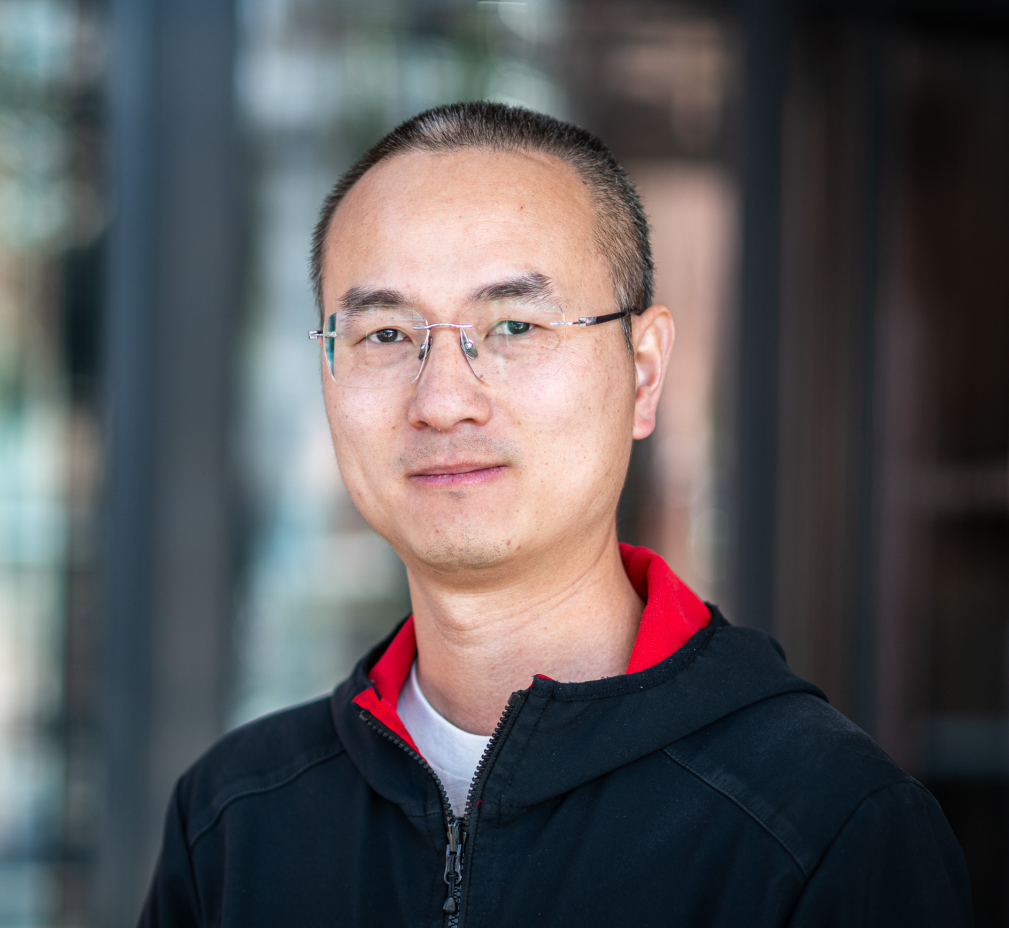Dr. Chang Ding

Curriculum Vitae
| 2023– |
Group leader "Anoxic Microbial Transformation" Department Molecular Environmental Biotechnology, UFZ |
| 2018–2023 | Scientist, UFZ |
| 2015–2018 | Humboldt Research Fellow, UFZ |
| 2014–2015 | Postdoctoral Researcher, National University of Singapore, Singapore |
| 2014 |
Ph.D. Department of Civil and Environmental Engineering National University of Singapore, Singapore |
| 2008 |
Bachelor of Engineering Department of Environmental Science and Engineering (School of Environment) Tsinghua University, Beijing, China |
Research interests
- Microbial processes (primarily anoxic/anaerobic) that are of environmental relevance (contaminant removal, resource recovery)
- Anaerobic ammonium oxidation (anammox) and other novel processes in the nitrogen cycle
- Energy-efficient and resource-recovering wastewater treatment
- Transformation of trace organic contaminants in engineered systems under different redox conditions (constructed wetlands, marsh plant roofs, bank filtration systems)
- Reactor techniques: automated reactors with fine controls, sensors, cultivation of fastidious microorganisms
- Proteomics: metaproteomics, protein stable isotope probing, limited proteolysis mass spectrometry
For more details, please refer to the group page of "Anoxic Microbial Transformation".
EFRE/SAB-funded project "RE-ENTRY" - Ressourcen- und Energierückgewinnung in einer Abwasserbehandlung mit minimiertem Treibhausgasausstoß (Resource and energy recovery in wastewater treatment with minimized greenhouse gas emissions) (2025-2027)

- Zhao S., Rogers M.J., Ding C., He J.* (2026):
Stable function, dynamic phylotypes: Microdiversity as a reservoir for resilience in Dehalococcoides
Environmental Science & Technology. 60, 3364–3373 - Huang X., Ye, Z.-L.*, Ding C., Adrian L., Liao W. (2026):
Mitigating tetracyclines in struvite recovery from swine wastewater by respectively applying unactivated and activated peroxymonosulfate oxidation
Journal of Hazardous Materials. 501, 140795 - Klaes S.*, White C., Alvarez-Cohen L., Adrian L., Ding C. (2025):
De novo peptide databases enable protein-based stable isotope probing of microbial communities with up to species-level resolution
Environmental Microbiome. 20, 111 - Zhao S., Rogers M.J., Xu G., Low A., Ding, C., He J.* (2025):
Microbial cooperative molecular strategies enabling 1,2-dichloroethane detoxification in low pH aquifers
Environmental Science & Technology. 59, 17655–17665 - Ude E.O., Sure P., Rimjhim R., Adrian L., Ding C.* (2025):
Fractionating proteins with nitrite-reducing activity in "Candidatus Kuenenia stuttgartiensis" strain CSTR1
Frontiers in Microbiology. 16, 1483703 - Schmidt T., Ding C., Moreno-Chicano T., Granatino P., Nickel J., Zimmermann S., Adrian L., Dietl A.*, Barends T.* (2025):
Roles of acyl carrier proteins in ladderane fatty acid producing-organisms
Biochimica et Biophysica Acta (BBA) - General Subjects. 1869, 130763 - Pan M., Colpo R.A., Roussou S., Ding C., Lindblad P., Krömer J.O.* (2025):
Engineering a photoautotrophic microbial coculture toward enhanced biohydrogen production
Environmental Science & Technology. 59, 337-348 - Liu Y., Rohwerder T.*, Bonatelli M.L., von Postel T., Kleinsteuber S., Adrian L., Ding C.* (2024):
A novel sulfatase for acesulfame degradation in wastewater treatment plants as evidenced from Shinella strains
Environmental Science & Technology. 58, 18892–18902 - Akay C., Ulrich N., Rocha U., Ding C., Adrian L.* (2024):
Sequential anaerobic–aerobic treatment enhances sulfamethoxazole removal: From batch cultures to observations in a large-scale wastewater treatment plant
Environmental Science & Technology. 58, 12609-12620 - Zhao S., Rogers M.J., Ding C., Xu G., He J.* (2024):
Interspecies mobility of organohalide respiration gene clusters enables genetic bioaugmentation
Environmental Science & Technology. 58, 4214-4225 - Bonatelli M.L., Rohwerder T.*, Popp D., Liu Y., Akay C., Schultz C., Liao K.-P., Ding C., Reemtsma T., Adrian L., Kleinsteuber S.* (2023):
Recently evolved combination of unique sulfatase and amidase genes enables bacterial degradation of the wastewater micropollutant acesulfame worldwide
Frontiers in Microbiology. 14, 1223838 - Ude E.O., Haas J., Kayoum M.K., Ding C.*, Adrian L. (2023):
Effects of reducing, stabilizing, and antibiotic agents on “Candidatus Kuenenia stuttgartiensis”
Applied Microbiology and Biotechnology. 107, 1829-1843 - Reino C., Ding C.*, Adrian L. (2023):
Continuous cultivation of Dehalococcoides mccartyi with brominated tyrosine avoids toxic byproducts and gives tight reactor control
Water Research. 229, 119396 - Zhao S., Ding C., Xu G., Rogers M.J. Ramaswamy R., He J.* (2022):
Diversity of organohalide respiring bacteria and reductive dehalogenases that detoxify polybrominated diphenyl ethers in E-waste recycling sites
The ISME Journal. 16, 2123-2131 - Zhao S., Rogers M., Cao L., Ding C., He J.* (2021):
Identification of reductive dehalogenases that mediate complete debromination of penta- and tetrabrominated diphenyl ethers in Dehalococcoides spp.
Applied and Environmental Microbiology. 87, e00602-21 - Budhraja R., Karande S., Ding C., Ullrich M.K., Wagner S., Reemtsma T., Adrian L.* (2021):
Characterization of membrane-bound metalloproteins in the anaerobic ammonium-oxidizing bacterium “Candidatus Kuenenia stuttgartiensis” strain CSTR1
Talanta. 223, 121711 - Ding C.*, Adrian L. (2020):
Comparative genomics in “Candidatus Kuenenia stuttgartiensis” reveal high genomic plasticity in the overall genome structure, CRISPR loci and surface proteins
BMC Genomics. 21, 851 - Ding C., Rogers M.J., He J.* (2020):
Dehalococcoides mccartyi strain GEO12 has a natural tolerance to chloroform inhibition
Environmental Science & Technology. 54, 8750–8759 - Ding C.*, Adrian L., Peng Y., He J.* (2020):
16S rRNA gene-based primer pair showed high specificity and quantification accuracy in detecting freshwater Brocadiales anammox bacteria
FEMS Microbiology Ecology. 96, fiaa013 - Budhraja R., Ding C., Walter P., Wagner S., Reemtsma T., Sawers, G.R., Adrian L.* (2019):
The impact of species, respiration type, growth phase and genetic inventory on absolute metal content of intact bacterial cells
Metallomics, 11, 925-935 - Wang Q., Ding C., Tao G., He J.* (2019):
Analysis of enhanced nitrogen removal mechanisms in a validation wastewater treatment plant containing anammox bacteria
Applied Microbiology and Biotechnology, 103, 1255–1265 - Ding C.*, Enyi F.O., Adrian L. (2018):
Anaerobic ammonium oxidation (anammox) with planktonic cells in a redox-stable semicontinuous stirred-tank reactor
Environmental Science & Technology. 52, 5671-5681 - Ding C., Alvarez-Cohen L.*, He J.* (2018):
Growth of Dehalococcoides mccartyi species in an autotrophic consortium producing limited acetate
Biodegradation, 29, 487-498 - Zhao S., Rogers M.J., Ding C., He J.* (2018):
Reductive debromination of polybrominated diphenyl ethers - microbes, pathways and dehalogenase
Frontiers in Microbiology. 9, 1292 - Ding C., Rogers M.J., Yang K.-L., He J.* (2017):
Loss of the ssrA genome island led to partial debromination in the PBDE respiring Dehalococcoides mccartyi strain GY50
Environmental Microbiology. 19, 2906 - 2915 - Zhao S., Ding C., He J.* (2017):
Genomic characterization of Dehalococcoides mccartyi strain 11a5 reveals a circular extrachromosomal genetic element and a new tetrachloroethene reductive dehalogenase gene
FEMS Microbiology Ecology. 93, fiw235 - Ding C., Yang K.-L., He J. (2016):
Biological and fermentative production of hydrogen
In: Luque, R., Lin, C.S.K., Wilson, K., Clark, J., (eds.)
Handbook of biofuels production: processes and technologies (Second edition)
Woodhead Publishing series in energy 98
Woodhead Publishing, Cambridge, p. 303 - 333 - Zhao S., Ding C., He J.* (2015):
Detoxification of 1,1,2-trichloroethane to ethene by Desulfitobacterium and identification of its functional reductase gene
PLoS ONE. 10, e0119507 - Ding C., Zhao S., He J.* (2014):
A Desulfitobacterium sp. strain PR reductively dechlorinates both 1,1,1-trichloroethane and chloroform
Environmental Microbiology. 16, 3387-3397 - Ding C., Chow W.L., He J.* (2013):
Isolation of Acetobacterium sp. strain AG that reductively debrominates octa- and penta- brominated diphenyl ether technical mixtures
Applied and Environmental Microbiology. 79, 1110-1117 - Ding C., He J.* (2012):
Molecular techniques in the biotechnological fight against halogenated compounds in anoxic environments
Microbial Biotechnology. 5, 347-367 - Lee L.K., Ding C., Yang K.-L., He J.* (2011):
Complete debromination of tetra- and penta- brominated diphenyl ethers by a coculture consisting of Dehalococcoides and Desulfovibrio species
Environmental Science & Technology. 45, 8475-8482 - Ning D., Wang H.*, Ding C., Lu H. (2010):
Novel evidence of cytochrome P450-catalyzed oxidation of phenanthrene in Phanerochaete chrysosporium under ligninolytic conditions
Biodegradation. 21, 889-901 - Ding C., He J.* (2010):
Effect of antibiotics in the environment on microbial populations
Applied Microbiology and Biotechnology. 87, 925-941
Raspberry Pi-based bioreactor
- A Python-based script for controlling syringe pump-driven bioreactors using Raspberry Pi. The bioreactors can be operated either in (semi-)continuous or batch mode
- Role: main developer
- Key features: reactor control (pump, sensor, valve, etc), data storage, graphical interface, real time plot, remote control, expandable with new sensors
- Repository: git.ufz.de/dingc/Bioreactor
- License: MIT
De novo stable isotope probing
- A Python and Shell-based script for protein stable isotope probing (SIP) using de novo peptide sequencing
- Role: main developer (shared with Simon Klaes)
- Key features: Denovo-SIP applies de novo peptide sequencing to generate sample-specific fasta databases used for protein SIP on samples with unknown composition (e.g. environmental samples).
- Repository: git.ufz.de/MEB/denovo-SIP
- License: MIT
Molecular Environmental Engineering (TU Berlin)
2022–current: Integrated module for master students (6x 1.5h lectures + 4 day practical course)
Projekt Ingeniueurwissenschaften (PIW) (TU Berlin)
2025-current: first-semester project for undergraduates (co-supervision)
